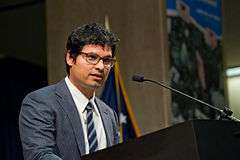1976 in the United States
This list is incomplete; you can help by expanding it.
| 1976 in the United States | |
|---|---|
| Years: | 1973 1974 1975 – 1976 – 1977 1978 1979 |
|
| |
 50 stars (1960–present) | |
|
Timeline of United States history
| |
Events from the year 1976 in the United States.
Incumbents
Federal Government
- President: Gerald Ford (R-Michigan)
- Vice President: Nelson Rockefeller (R-New York)
- Chief Justice: Warren E. Burger (Minnesota)
- Speaker of the House of Representatives: Carl Albert (D-Oklahoma)
- Senate Majority Leader: Mike Mansfield (D-Montana)
- Congress: 94th
Events
January
- January 11 – 1976 Flyers-Red Army game: The Philadelphia Flyers play the Soviet Red Army team, the Red Army left the ice for a portion of the game and the Flyers won 4–1
- January 15 – Would-be Gerald Ford presidential assassin Sara Jane Moore is sentenced to life in prison.
- January 18 – Super Bowl X: The Pittsburgh Steelers defeat the Dallas Cowboys 21–17 at the Orange Bowl in Miami, Florida.
- January 19 – Jimmy Carter wins the Iowa Democratic Caucus.
- January 27 – The United States vetoes a United Nations resolution that calls for an independent Palestinian state.
- January 30 – Live from Lincoln Center debuts on PBS.
February
- February 5 – Nearly 2,000 students become involved in a racially charged riot at Escambia High School in Pensacola, Florida; 30 students are injured in the 4-hour fray.
- February 11 – Clifford Alexander, Jr. is confirmed as the first African-American Secretary of the United States Army.
March
- March 9–11 – Two coal mine explosions claim 26 lives at the Blue Diamond Coal Co. Scotia Mine in Letcher County, Kentucky.[1]
- March 17 – Rubin "Hurricane" Carter is arrested in New Jersey.
- March 20 – Patty Hearst is found guilty of armed robbery of a San Francisco bank.
- March 27 – The first 4.6 miles of the Washington Metro subway system opens.
- March 31 – The New Jersey Supreme Court rules that persistent vegetative state patient in the Karen Ann Quinlan case can be disconnected from her ventilator. She remains comatose and dies in 1985.
April

April 1: Conrail
- April 1
- Conrail (Consolidated Rails Corporation) is formed by the U.S. government, to take control of 13 major Northeast Class-1 railroads that had filed for bankruptcy protection. Conrail takes control at midnight, as a government-owned and operated railroad until 1986, when it is sold to the public.
- Apple Computer Company is formed by Steve Jobs and Steve Wozniak.[2]
- April 13 – The United States Treasury Department reintroduces the two-dollar bill as a Federal Reserve Note on Thomas Jefferson's 233rd birthday as part of the United States Bicentennial celebration.
May
- May 11 – U.S. President Gerald Ford signs the Federal Election Campaign Act.
- May 24 – Washington, D.C. Concorde service begins.
- May 25 – U.S. President Gerald Ford defeats challenger Ronald Reagan in three Republican presidential primaries: Kentucky, Tennessee and Oregon.
- May 30 – Indianapolis 500-Mile Race: Johnny Rutherford wins the (rain-shortened) shortest race in event history to date, at 102 laps or 255 miles (408 km).
June
- June 2 – A car bomb fatally injures Arizona Republic reporter Don Bolles.
- June 5 – The Teton Dam collapses in southeast Idaho in the U.S., killing 11 people.
- June 13 – Savage thunderstorms roll through the state of Iowa spawning several tornadoes, including an F-5 tornado that destroys the town of Jordan, Iowa.
- June 16 – Francis E. Meloy, Jr., the newly appointed United States Ambassador to Lebanon, is assassinated in Beirut.
- June 17 – The National Basketball Association and the American Basketball Association agree on the ABA-NBA merger.
- June 20 – Hundreds of Western tourists are moved from Beirut and taken to safety in Syria by the U.S. military, following the murder of the U.S. ambassador to Lebanon.
July

July 4: United States Bicentennial
- July 3 – Gregg v. Georgia: The Supreme Court of the United States rules that the death penalty is not inherently cruel or unusual and is a constitutionally acceptable form of punishment.
- July 4
- United States Bicentennial: From coast to coast, the United States celebrates the 200th anniversary of the Declaration of Independence.
- The Puerto Rican Socialist Party leads 50,000 marchers in Philadelphia to demand a "Bicentennial Without Colonies" and independence for Puerto Rico.
- July 6 – The first class of women is inducted at the United States Naval Academy in Annapolis, Maryland.
- July 15 – Jimmy Carter is nominated for U.S. President at the Democratic National Convention in New York City.
- July 20 – Viking program: The Viking 1 lander successfully lands on Mars, taking the first close-up color photos of the planet's surface.
- July 26 – In Los Angeles, Ronald Reagan announces his choice of liberal U.S. Senator Richard Schweiker as his vice presidential running mate, in an effort to woo moderate Republican delegates away from President Gerald Ford.
- July 29 – In New York City, the "Son of Sam" pulls a gun from a paper bag, killing 1 and seriously wounding another, in the first of a series of attacks that terrorize the city for the next year.
- July 31
- NASA releases the famous Face on Mars photo, taken by Viking 1.
- The Big Thompson River in northern Colorado floods, destroying more than 400 cars and houses.
August

August 18: Axe murder incident
- August 1 – The Seattle Seahawks and Tampa Bay Buccaneers play their first football game.
- August 2 – A gunman murders Andrea Wilborn and Stan Farr and injures Priscilla Davis and Gus Gavrel, in an incident at Priscilla's mansion in Fort Worth, Texas. T. Cullen Davis, Priscilla's estranged husband and one of the richest men in Texas, is tried and found not guilty in 1977.
- August 4 – The first recognized outbreak of Legionnaires' disease kills 29 at the American Legion convention in Philadelphia.
- August 7 – Viking program: Viking 2 enters into orbit around Mars.
- August 18 – At Panmunjom, North Korea, 2 United States soldiers are killed while trying to chop down part of a tree in the Korean Demilitarized Zone which had obscured their view.
- August 19 – U.S. President Gerald Ford edges out challenger Ronald Reagan to win the Republican Party presidential nomination in Kansas City.
September
- September 3 – Viking program: The Viking 2 spacecraft lands at Utopia Planitia on Mars
- September 6
- Cold War: Soviet Air Force pilot Lt. Viktor Belenko lands a MiG-25 jet fighter at Hakodate, on the island of Hokkaidō in Japan, and requests political asylum from the United States.
- Frank Sinatra brings Jerry Lewis's former partner Dean Martin onstage, unannounced, at the 1976 Jerry Lewis MDA Telethon in Las Vegas, Nevada, reuniting the comedy team for the first (and only) time in over 20 years.
- September 17 – The space shuttle Enterprise is rolled out of a Palmdale, California hangar.
- September 21 – Orlando Letelier is assassinated in Washington, D.C. by agents of Chilean dictator Augusto Pinochet.
- September 24 – Patricia Hearst is sentenced to 7 years in prison for her role in a 1974 bank robbery (an executive clemency order from U.S. President Jimmy Carter will set her free after only 22 months).
October
- October 6 – In San Francisco, during his second televised debate with Jimmy Carter, U.S. President Gerald Ford stumbles when he declares that "there is no Soviet domination of Eastern Europe" (there is at the time).
- October 13 – The United States Commission on Civil Rights releases the report, Puerto Ricans in the Continental United States: An Uncertain Future, that documents that Puerto Ricans in the United States have a poverty rate of 33 percent in 1974 (up from 29 percent in 1970), the highest of all major racial-ethnic groups in the country (not including Puerto Rico, a U.S. territory).
- October 18 – Ford officially launches volume production of Fiesta car at its Valencia plant.
- October 19 – The Copyright Act of 1976 extends copyright duration for an additional 20 years in the United States.
- October 20 – The Mississippi River ferry MV George Prince is struck by a ship while crossing from Destrehan, Louisiana to Luling, Louisiana, killing 78 passengers and crew.
- October 21 – The Cincinnati Reds sweep the New York Yankees in four games to win the 1976 World Series.
November

November 2: Jimmy Carter elected President
- November 2 – U.S. presidential election, 1976: Jimmy Carter defeats incumbent Gerald Ford, becoming the first candidate from the Deep South to win since the Civil War.
- November 15 – The first megamouth shark is discovered off Oahu in Hawaii.
- November 25 – In San Francisco, The Band holds its farewell concert, The Last Waltz.
- November 26 – Microsoft is officially registered with the Office of the Secretary of the State of New Mexico.
December
- December 8
- The Congressional Hispanic Caucus is established by the five Latinos in the United States Congress: Herman Badillo of New York, E. de la Garza and Henry B. Gonzalez of Texas, Edward R. Roybal of California, and the nonvoting Resident Commissioner of Puerto Rico, Baltasar Corrada del Rio.
- Hotel California by The Eagles is released.
- December 20 – Richard J. Daley, Mayor of Chicago for 21 years, dies while in office.
Undated
- California's sodomy law is repealed.
- The New Jersey State Legislature passes legislation legalizing casinos in the shore town of Atlantic City commencing in 1978. After signing the bill into law, Governor Brendan Byrne declares "The mob is not welcome in New Jersey!" referring to the Mafia's influence at casinos in Nevada.
Ongoing
- Cold War (1945–1991)
- Détente (c. 1969–1979)
- Capital punishment suspended by Furman v. Georgia (1972–1976)
- 1970s energy crisis (1973–1980)
Births
- January 4 - Ted Lilly, baseball player
- January 2 - Phil Radford, environmental, clean energy, and democracy leader
- January 13 - Michael Peña, actor and musician
- January 20 - Michael Myers, American football player
- January 27
- Clint Ford, voice actor
- Fred Taylor, American football player
- January 29 - Chris Castle, singer-songwriter and guitarist
- February 17 - Scott Williamson, American baseball player and coach
- March 20 - Chester Bennington, lead singer of Linkin Park
- March 22 - Reese Witherspoon, actress
- March 24 - Peyton Manning, American football player
- March 26 - Amy Smart, actress and former fashion model
- June 8 – Eion Bailey, actor
- July 15 - Gabriel Iglesias, comedian, actor, producer
- August 26 - Glen Ramsey, entomologist
-

Phil Radford, environmental, clean energy, democracy leader
-

Michael Peña, actor and musician
-

Amy Smart, actress and former fashion model
Deaths
See also: Deaths in 1976
- April 9 — Phil Ochs American protest singer and songwriter (born 1940)
- August 26 — Lotte Lehmann, German-born American soprano (b. 1888)
See also
References
- ↑ "Partridge, KY Double Mine Disaster, Mar 1976". GenDisasters. Retrieved September 14, 2010.
- ↑ Mitchell K. Hall (2008). "Chronology". Historical Dictionary of the Nixon-Ford Era. Scarecrow Press. ISBN 978-0-8108-6410-8.
External links
-
 Media related to 1976 in the United States at Wikimedia Commons
Media related to 1976 in the United States at Wikimedia Commons - "1976". Timeline. Digital Public Library of America.
This article is issued from Wikipedia - version of the 10/29/2016. The text is available under the Creative Commons Attribution/Share Alike but additional terms may apply for the media files.